Pork at the table, not at the altar: A Chinese Singaporean clan’s Muslim legacy
Despite generations living in Singapore, the descendants of the Guo clan from Baiqi, Fujian, China, remain close-knit while assimilating Chinese cultural and Muslim customs. Lianhe Zaobao lifestyle correspondent Tang Ai Wei speaks with clan members to find out how they keep the kinship ties alive in Singapore.
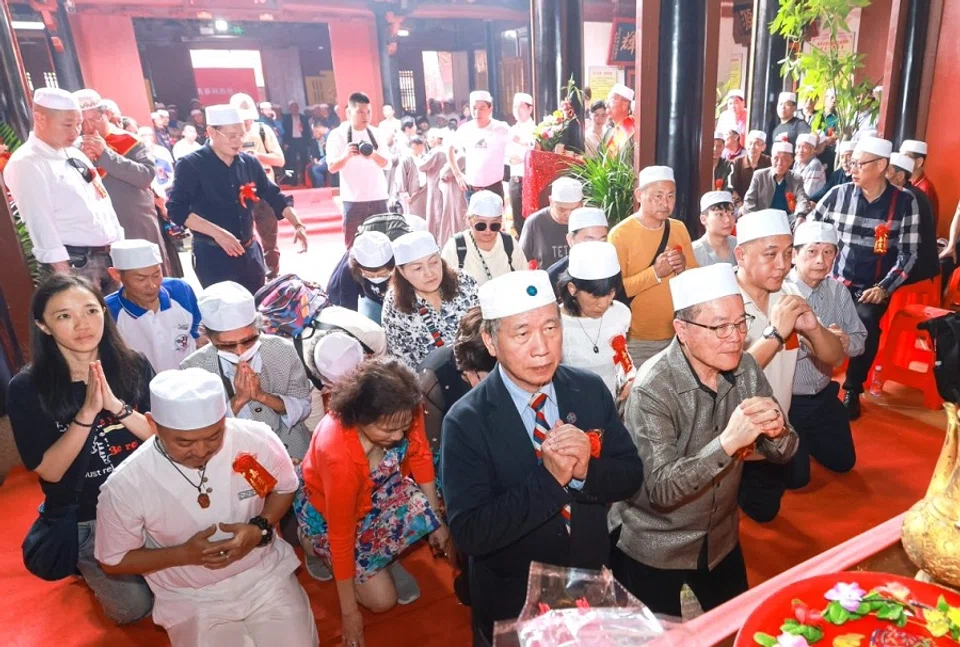
Every year on the 22nd day of the eighth lunar month, which marks the birthday of Kong Tek Chun Ong (广泽尊王), members of the mutual aid society Fu Quan He (福泉和) and their descendants would come together. In 2024, they held a 20-table banquet at the Singapore Hui Ann Association in Lorong 29 Geylang. The reunion not only celebrates a deity’s birthday, but also serves to preserve the presence of the Guo clan from Baiqi (百崎), Fujian, China, in Singapore.
Currently, there are about 600 to 700 descendant households of the Baiqi Guo clan in Singapore. I spoke with some of the last few batches of Baiqi Guo descendants who came to Singapore from China, to understand this kinship community centred around a surname.
In the book Where Land Meets Sea: Hui’an Revisited, Chen Yu, an assistant professor at the National University of Singapore, mentioned that Fujian’s Quanzhou is the starting point of the ancient Maritime Silk Road, and its harbour once attracted merchants from all over. She believes that the Baiqi Guo clan are descendants of Arabs or Persians, although they have gradually assimilated into Chinese culture over their long history of residing in China.
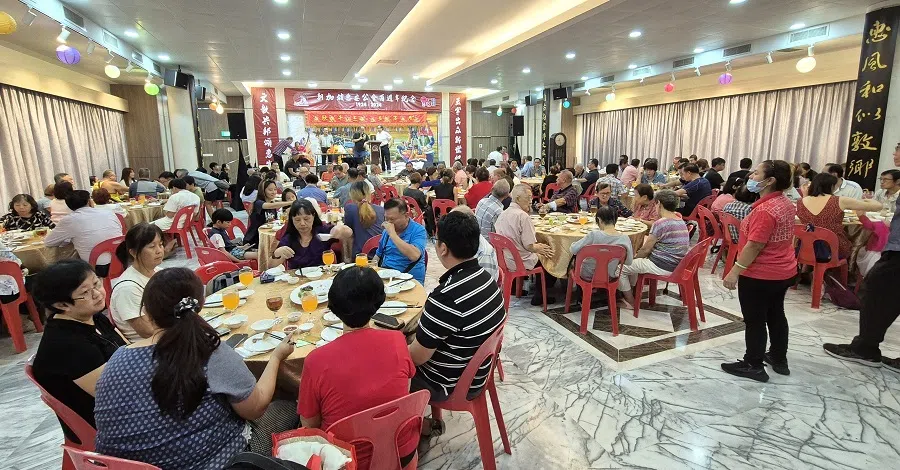
After the establishment of New China, the Baiqi Guo clan was designated as Hui people (回族), and Baiqi became the only Hui township among the 19 ethnic minority townships in Fujian. In 2010, Baiqi was incorporated into the Quanzhou Taiwan Investment Zone.
The last batch of descendants who came to Singapore
Kwek Hiang Hwee, 78, told Lianhe Zaobao that due to Baiqi’s barren land and lack of resources, large numbers of clansmen ventured to Southeast Asia, a migration that can be divided into three periods. The earliest was during the turbulent late Qing dynasty, when clansmen sought livelihoods as sailors. This was followed by the Chinese Civil War period, when young men fled their homes to avoid being conscripted by the Kuomintang government. The final wave occurred between 1953 and 1956, when the colonial government of Singapore allowed the wives and children of the Chinese men already residing locally to come over.
Kwek said, “My grandfather sailed to Singapore around 1910 and may be one of the earliest Baiqi Guo clansmen to venture to Southeast Asia. My father came around 1930, while my mother and I came later in 1955, when I was only nine years old.”
After arriving in Singapore, many Baiqi Guo clansmen worked as coolies at the piers. As early as the 1920s, they rented a shophouse at 75 Haji Lane to use as a “coolie keng” (估俚间, labourers’ quarters) and established the mutual aid society Fu Quan He.
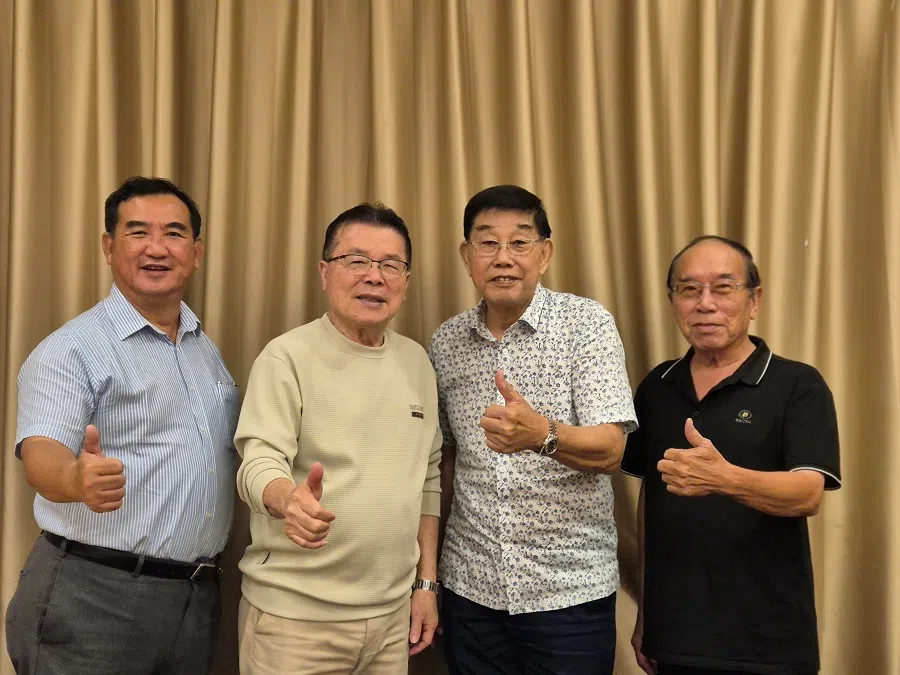
The grandfather of another descendant, 78-year-old Kay Khim Tong, came to Southeast Asia in 1920, while his father came in 1930. Kay himself came to Singapore with his mother in 1953.
Some Islamic practices remain
After arriving in Singapore, many Baiqi Guo clansmen worked as coolies at the piers. As early as the 1920s, they rented a shophouse at 75 Haji Lane to use as a “coolie keng” (估俚间, labourers’ quarters) and established the mutual aid society Fu Quan He. Some clansmen also rented houses nearby.
“This is passed down from our ancestors. We never use pork when making offerings or worshipping our ancestors. As far as I know, some of the older generation choose to abstain from pork before they pass away, to purify themselves before meeting their ancestors.” — Kwek Hiang Hwee, a member of the Baiqi Guo clan
To this day, it remains a mystery why they congregated in the Kampong Glam area (well known today as Singapore’s Muslim quarter), though it may be related to their ancestors’ Hui background. The interviewees heard that some of their ancestors would pray at the nearby mosque in the early times, but they had never seen it themselves before. Most of their ancestors also worshipped Kong Tek Chun Ong. When the coolie keng was reclaimed by the owner in 1995, the enshrined statue of Kong Tek Chun Ong was entrusted to a rotating main censer master, who takes it home to worship every year.
Although the Guo descendants have long assimilated into Chinese culture, adhering to Taoism or other religions and do not abstain from pork, they are still influenced by some Islamic customs, particularly the practice of not offering pork to the dead. Kwek Hiang Hwee said, “This is passed down from our ancestors. We never use pork when making offerings or worshipping our ancestors. As far as I know, some of the older generation choose to abstain from pork before they pass away, to purify themselves before meeting their ancestors.”
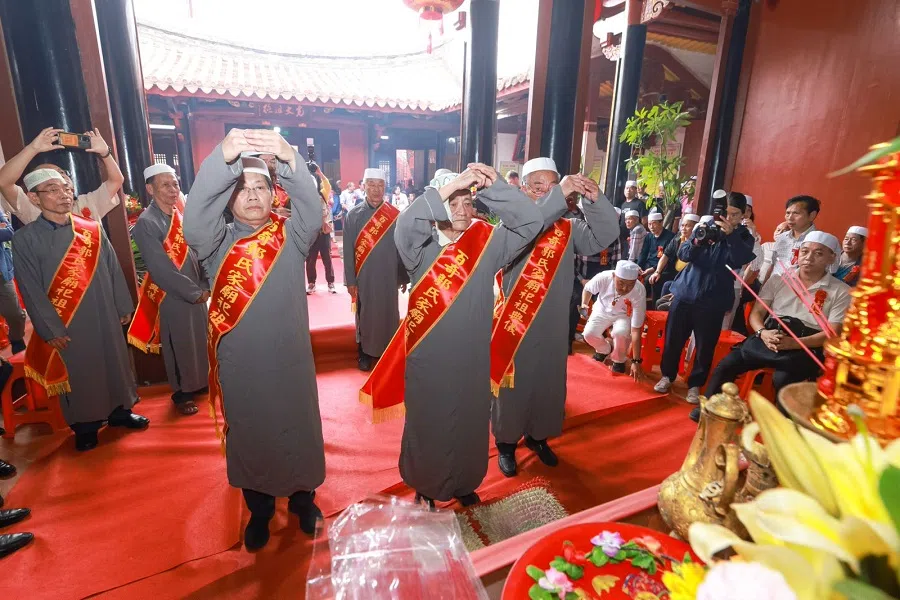
A few Guo households in Singapore still maintain separate sets of pots, pans and utensils that never come into contact with pork. These are carefully wrapped and stored away, taken out to use only during ancestral worship ceremonies. These wares are even passed down from generation to generation, as an “heirloom” from mother-in-law to daughter-in-law.
During this spring ancestral ceremony, the main ritualist would don a long robe and a white cap.
Descendants such as Kwek Hiang Hwee and Kwek Theng Swee, former chairman of the Singapore Hui Ann Association, try their best to attend ancestral worship ceremonies at the Baiqi ancestral hall in Fujian during Qingming Festival. Clansmen from other places, like Malaysia and Taiwa,n would also attend. During this spring ancestral ceremony, the main ritualist would don a long robe and a white cap.
Bonding fellow clansmen together
Although the mutual aid society Fu Quan He is not a registered organisation in Singapore, it has endured for a century and is the glue that holds the descendants of the Baiqi Guo clan together. They have settled down in Singapore and also joined the kinship-based Singapore Fen Yang Guo Association and locality-based Singapore Hui Ann Association.
Besides the birthday celebration of Kong Tek Chun Ong, descendants of the Baiqi Guo clan also gather on the first Saturday of the June school holidays. Designed as a family day, it features a buffet and games to attract the younger generation.
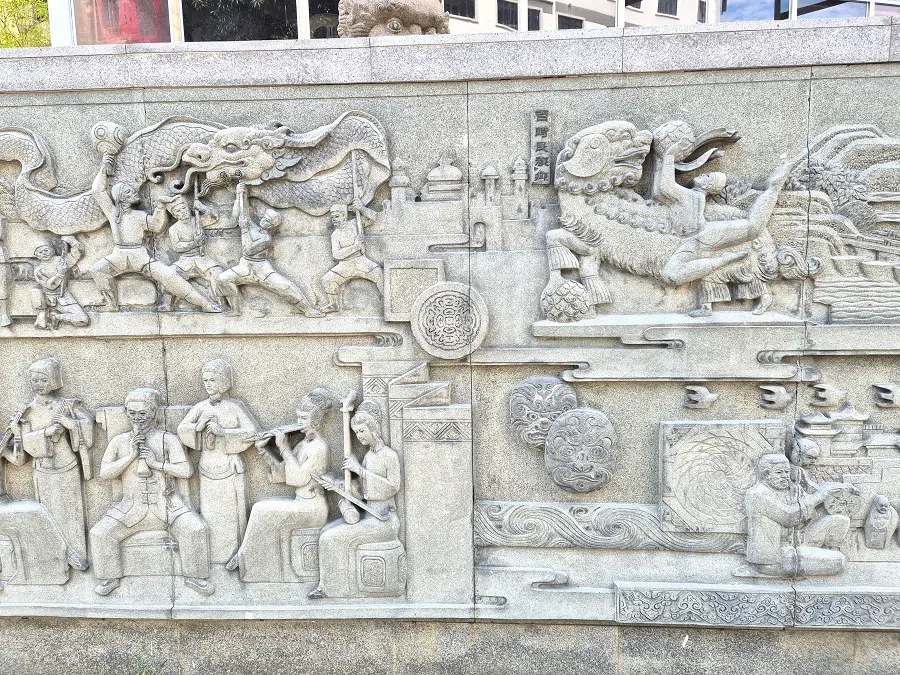
The last batch of Baiqi Guo clan descendants who came to Singapore from China are already in their 70s or 80s. They hope that these two annual gatherings will help the younger generation to get to know one another and maintain their ties to their ancestral homeland and clan. Quek Peng Peng, 59, was born in Singapore. He connected with other descendants through these gatherings and actively participates in and helps organise the events.
This article was first published in Lianhe Zaobao as “本地百崎郭氏后人 回族汉化不忘本”.





![[Big read] When the Arctic opens, what happens to Singapore?](https://cassette.sphdigital.com.sg/image/thinkchina/da65edebca34645c711c55e83e9877109b3c53847ebb1305573974651df1d13a)